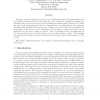Free Online Productivity Tools
i2Speak
i2Symbol
i2OCR
iTex2Img
iWeb2Print
iWeb2Shot
i2Type
iPdf2Split
iPdf2Merge
i2Bopomofo
i2Arabic
i2Style
i2Image
i2PDF
iLatex2Rtf
Sci2ools
106
click to vote
DFT
2009
IEEE
2009
IEEE
Errors in DNA Self-Assembly by Synthesized Tile Sets
This paper presents a study of errors that occur in DNA self-assembly using synthesized tile sets for template manufacturing. It is shown that due to the reduced size, aggregates assembled by a synthesized tile set are not error-free as those assembled by maximum-sized (referred to as a trivial tile set) as well asnon-synthesized tile sets. Compared with non-synthesized tile sets, aggregates assembled using synthesized tile sets also have a higher error rate at high tile concentration, but they exhibit a lower rate at low tile concentration. In this paper, it is also shown that errors in synthesized tile sets tend to appear in clusters. This is very different from non-synthesized tile sets of non-maximum size in which growth errors are mostly random in nature. These findings are discussed and evaluated for nano manufacturing (such as for template self-assembly of a QCA circuit).
Related Content
| Added | 20 May 2010 |
| Updated | 20 May 2010 |
| Type | Conference |
| Year | 2009 |
| Where | DFT |
| Authors | Xiaojun Ma, Masoud Hashempour, Yong-Bin Kim, Fabrizio Lombardi |
Comments (0)

